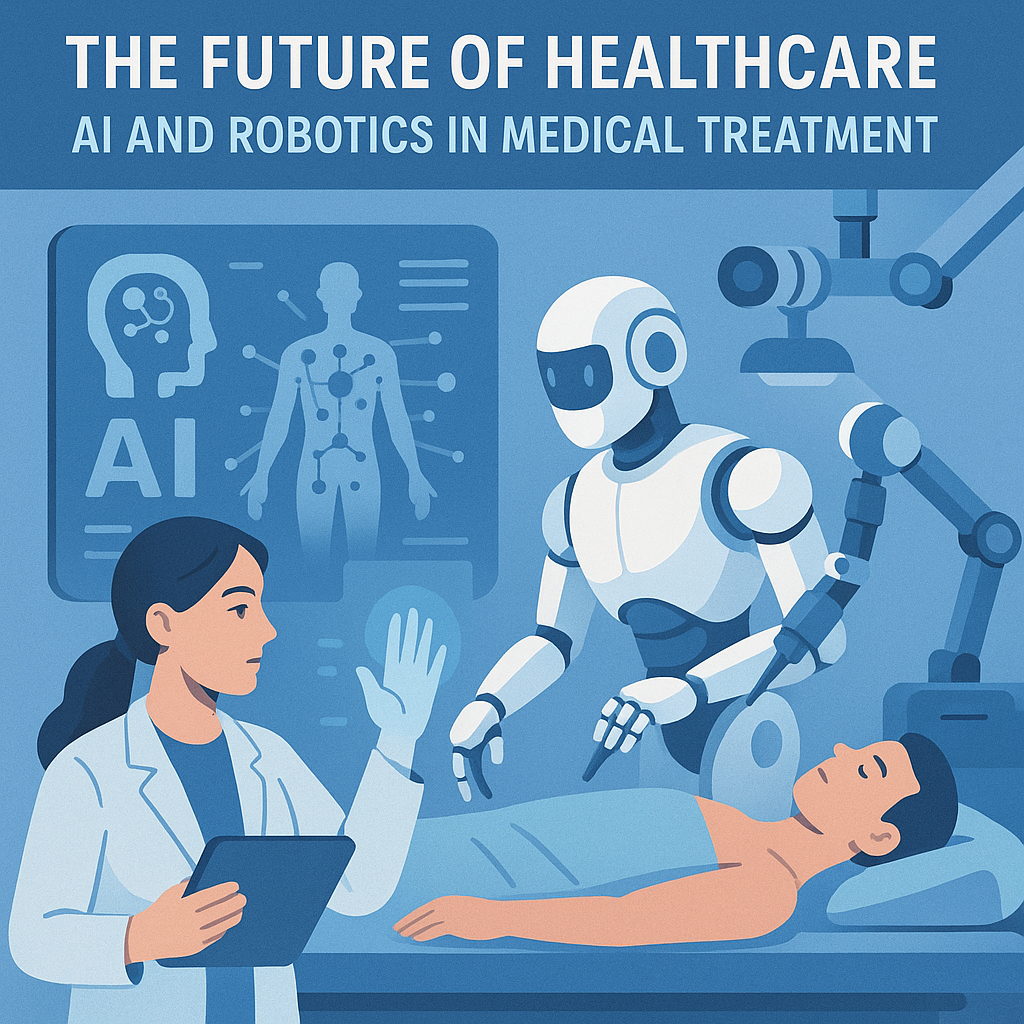Introduction: The Evolution of Healthcare Technology
Over the past few decades, healthcare has undergone a technological revolution. From electronic health records to telemedicine, innovation has continually reshaped the way medical professionals diagnose and treat patients. However, perhaps the most groundbreaking advancements in recent years have been in Artificial Intelligence (AI) and robotics.
The combination of AI-driven analytics and robotic precision has paved the way for unprecedented accuracy, efficiency, and personalization in patient care. From robotic-assisted surgeries to AI-powered diagnostics, the future of healthcare is heading towards a transformation that will redefine how medical services are delivered.
AI in Healthcare: A Game Changer
Understanding AI’s Role in Medicine
Artificial intelligence is not just a futuristic concept—it is already playing a crucial role in modern medicine. AI encompasses machine learning, deep learning, and natural language processing (NLP), allowing systems to analyze vast amounts of medical data to assist doctors in decision-making.
AI models can identify patterns in patient histories, suggest optimal treatment plans, and even predict the likelihood of diseases before symptoms appear. The power of AI is particularly evident in areas such as imaging, diagnostics, and personalized medicine.
Benefits of AI in Diagnostics
One of AI’s greatest contributions to healthcare is early disease detection. AI-powered systems analyze medical scans, blood tests, and genetic information to identify diseases with greater accuracy than traditional methods. For instance, AI algorithms have been shown to detect cancers, neurological disorders, and cardiovascular diseases earlier than human doctors, significantly increasing the chances of successful treatment.
AI in Personalized Treatment Plans
AI enables the creation of tailored treatment plans based on an individual’s medical history, genetics, and lifestyle. Rather than a one-size-fits-all approach, AI helps doctors design targeted therapies that improve treatment effectiveness while minimizing side effects.
AI for Drug Discovery and Development
The process of drug discovery, which typically takes years, can be significantly accelerated with AI. AI models analyze biological data to identify promising drug candidates, predict their efficacy, and even simulate how they interact with human cells. This innovation is revolutionizing pharmaceutical research and bringing life-saving drugs to market faster.
AI in Medical Imaging and Radiology
Medical imaging has benefited immensely from AI-powered analysis. MRI scans, CT scans, and X-rays can now be examined by AI algorithms to detect anomalies that may be overlooked by human radiologists. This not only improves accuracy but also reduces diagnosis time, allowing for quicker interventions.
Robotics in Medical Treatment: A Revolution in Precision
Surgical Robots: Enhancing Precision
Robotic-assisted surgeries, such as the da Vinci Surgical System, allow surgeons to perform complex procedures with unparalleled precision. These robots, controlled by surgeons, reduce the risk of human error, minimize incisions, and lead to faster patient recovery times.
Rehabilitation Robots: Aiding Recovery
Patients recovering from strokes, spinal injuries, or other mobility-related conditions can benefit from rehabilitation robots. These machines assist in physical therapy, ensuring that patients regain strength and movement with guided, repetitive exercises.
Robotic Assistance in Elderly Care
The aging population presents challenges in elderly care. Companion robots equipped with AI can monitor vital signs, remind patients to take medications, and even provide emotional support to seniors who may feel isolated.
Robotic Prosthetics and Exoskeletons
The integration of robotics in prosthetics has led to bionic limbs that respond to neural signals, enabling amputees to move prosthetic arms and legs as if they were natural limbs. Additionally, exoskeletons provide mobility support for individuals with paralysis or neuromuscular disorders.
Integration of AI and Robotics: A New Era in Healthcare
Synergy Between AI and Robotics in Healthcare
The true potential of AI and robotics lies in their seamless integration. AI-driven robots are capable of autonomous decision-making, making them invaluable in surgeries, diagnostics, and elderly care.
AI-driven Robotic Surgery
Future robotic systems will not only assist surgeons but may eventually perform surgeries autonomously, guided by AI-driven algorithms that analyze real-time surgical data.
Smart Assistive Devices for Patients
Smart wearable devices powered by AI and robotics can track vital signs, predict health risks, and alert medical professionals in emergencies.
Challenges and Ethical Concerns
Despite the promise of AI and robotics in medicine, challenges remain. Data privacy, AI bias, and concerns over job displacement must be addressed to ensure the ethical and responsible use of technology in healthcare.
Future Trends in AI and Robotics in Healthcare
The future holds exciting possibilities, including quantum computing in AI healthcare, fully autonomous robotic surgeries, and AI-powered mental health support through virtual therapists.
